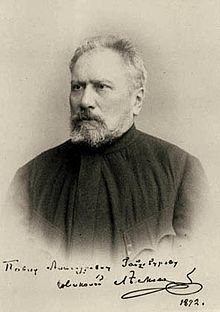Kotin the breadwinner and Platonida
Kotin the breadwinner and Platonida ( Russian Котин доилец и Платонида , Kotin doilez i Platonida ) is a fragmentary story by the Russian writer Nikolai Leskov , which appeared in the St. Petersburg Otetschestwennye Sapiski in April 1867 .
content
Axinja Matvejewna, the 18-year-old niece of the Stargorod merchant Semjon Dejew, is whipped and chased out of the house by her people. The orphan Axinja has luck in misfortune. The sexton Iona Pisonski takes her into his little house. Axinja becomes the sexton and gives birth to Constantine. Iona dies when Constantine is one year old. Axinja disguises the boy as a girl. The two are accommodated in a women's convent. At the age of twelve, Konstantin Pisonski, finally dressed as a boy, entered the spiritual community school. A dysgraphia because he calls himself Kotin. As a soldier, he served three years in a regimental church. The mother needs a breadwinner. By the time Kotin is finally released on her request, she has already died. Kotin remembers his relatives and goes to the Dejews in Stargorod. They mock him. While looking for shelter, Kotin remembers his mother's niece and goes there. She died and left two girls behind. Kotin takes the two orphans, a two- and a five-year-old, and ventures back to Stargorod to the Dejews. There he meets Semyon Deev's daughter-in-law, the 21-year-old Platonida Andrewna. The childless woman can only help with a bundle of worn adult clothing.
The elderly quack and midwife Fewronja Rochowna takes in Kotin and the little girls. Kotin produces and sells boot wax . The skilled craftsman wins over time the respect of the Stargorodians. The city council leaves him the desert island under the bridge in the river. Within four years the new Robinson Kotin clears the stain; built a hut. He also takes care of the two girls.
Platonida's husband, almost twenty years his senior, the hard-hearted Marko Dejew, dies. Platonida suddenly feels free; but not for long. The gray-haired businessman Semjon Dejew wants to take the place of his deceased son Marko with the young daughter-in-law and tries to rape her. Vain. Platonida defends himself with the ax , but does not hit properly because Marko's younger brother Awenir Dejew, who loves Platonida, intervenes. Old Dejew is taking revenge. His accusation is believed in court - Platonida and Awenir wanted to rob and murder him. Awenir is going to jail. The authorities are also investigating rumors that Platonida, who has disappeared since the violence, found shelter on Kotin's island. The search of the hut on the island remained without result. Kotin also goes to prison. The authorities and the Stargorodians believe that if anyone knows Platonida's whereabouts, it is Kotin. The latter is silent.
Kotin is released from prison. Awenir is allowed to serve in the Caucasus and has a military career.
reception
- 1959: Setschkareff observes how Leskow creates tension with ancillary things and mentions in the context “the gloomy, eerie erotic scene” in which Platonida is almost raped.
- 1967: Reissner complains that Leskow brought the fragment to an end "abruptly and without a satisfactory solution".
- 1988 Dieckmann writes about this “modern robinsonade” that Leskow dismisses “his heroes almost into the darkness of legend”.
literature
German-language editions
- Kotin the breadwinner and Platonida. German by Günter Dalitz. P. 437–486 in Eberhard Reissner (Ed.): Nikolai Leskow: Collected works in individual volumes. Love in bast shoes. With a comment from the editor. 747 pages. Rütten & Loening, Berlin 1967 (1st edition)
Output used:
- Kotin the breadwinner and Platonida. German by Günter Dalitz. P. 444–491 in Eberhard Dieckmann (Ed.): Nikolai Leskow: Collected works in individual volumes . Vol. 1: The Lady Macbeth from the Mtsensk district. Stories. 632 pages. Rütten & Loening, Berlin 1988 (1st edition), ISBN 3-352-00252-5
Secondary literature
- Vsevolod Sechkareff : NS Leskov. His life and his work. 170 pages. Verlag Otto Harrassowitz, Wiesbaden 1959
Web links
- The text
- Wikisource Котин доилец и Платонида (Лесков) (Russian)
- online at RVB.ru (Russian)
- Entry in the Laboratory of Fantastics (Russian)
